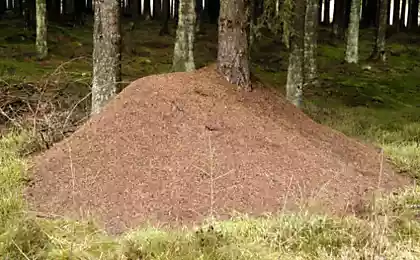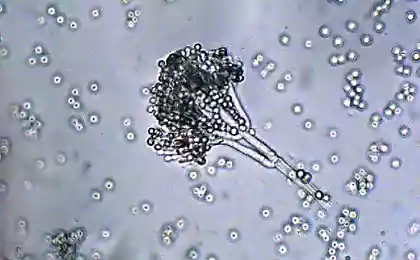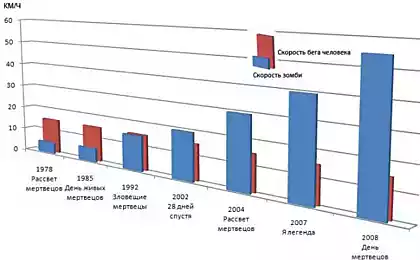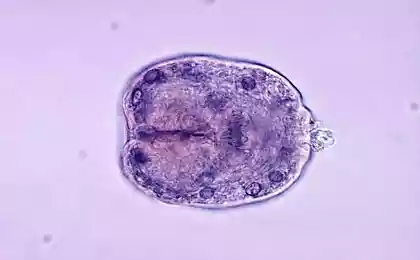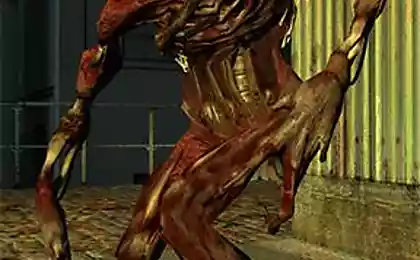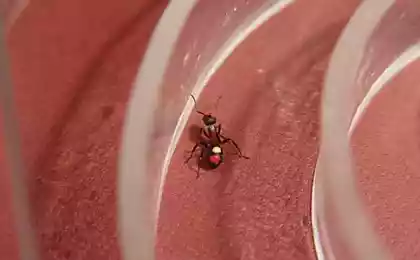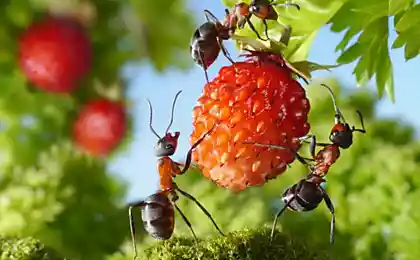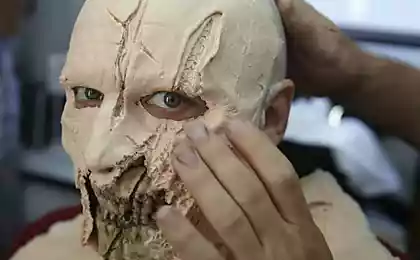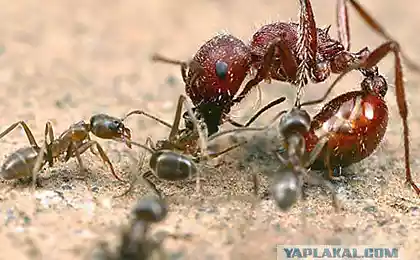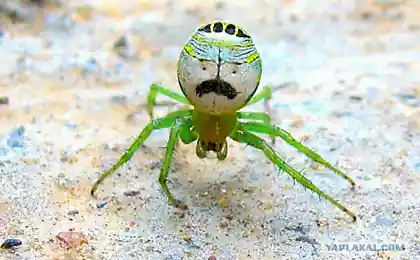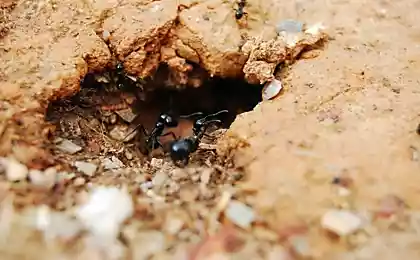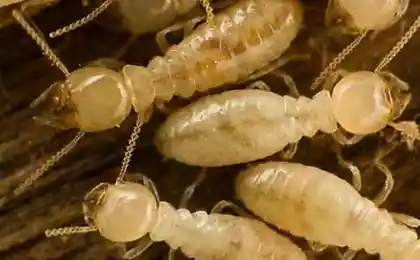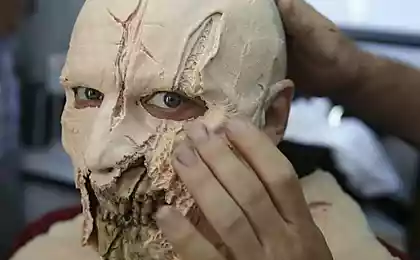481
Ants-zombies die on his doorstep
Zombieconomy a parasite fungus Cordyceps causes ants to die near the entrance of the anthill to spores of the fungus as quickly as possible found new owners.
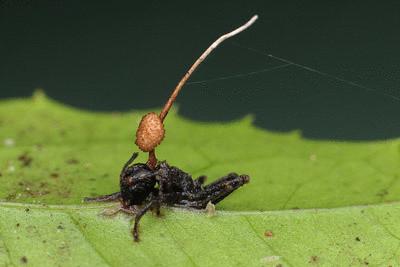
A dead ant with sprouted from it the parasitic fungus Cordyceps.
Fungi of the genus Cordyceps, parasitic on various insects, known for his ability to control the behavior of the victims. If, for example, in the ant, the fungus affects the nervous system so that the ant died in the place where you have fungus. So, the parasite Ophiocordyceps camponoti-rufipedis infecting carpenter ants Camponotus rufipes, makes his victims before death to crawl on the lower side of a sheet and to die in order to move the jaws in the vein of the leaf. Then from the corpse of an ant, the fungus sprouts out and disperses the spores. This insect behavior is quite unusual, so the Cordyceps called mushroom zombification that turns ants into zombies, subordinate to the will of another.
It would seem to ensure the spread of spores, the fungus will have to drive the ant in the anthill. However ants works well sanitary service – if the ant found a dead ant, it quickly pull "cemetery" where no one goes. We can say that ants have a social immunity. Zoologists from the University of Pennsylvania saw this, putting this experiment in a few ant hills threw the dead insects with a mushroom inside. The experience is set in a natural environment, that is, with these nests, and not with the laboratory, half of them were empty, i.e. without ants at all.
As the researchers write in their article in PLoS ONE, the fungus could not give a dispute in any case. If he threw in an anthill with people living in it ants, the proportion of infected corpses just disappeared – the owners cleaned the house from potential infection. However, importantly, the parasitic fungus could not develop even in empty nests. That is, apparently, Cordyceps interfere with the microclimate of the ant's house, the local environmental conditions. So it is understandable why the fungus causes its victim to move away from the nest.
But that's not all. David Hughes (David Hughes), along with colleagues analyzed the location of ant corpses hanging from the leaves, around the same ant colonies in the forests on the South-East of Brazil. For 20 months zoologists estimated how the ants in a particular colony are suffering from parasites, where hang the infected dead, and what is the pattern of ant trails around their nests. It turned out that, although the fungus and does not want to be in the anthill, it directs the ant-host closer to the main walkways leading to the nest. In fact, the Cordyceps causes the ant to die near the threshold of the house: on the one hand, preddverno the territory of the social immune system of ants not already covered, the body hence one will not be clean, on the other hand, there is constantly someone walking, and mushroom is guaranteed to infect someone with your disputes.
However, as noted by the authors, in spite of such "cunning" of a parasitic fungus, it does not lead to the extinction of ant colonies. That is, the parasite has been something of a chronic disease that can be kept in the framework, but which yet can not completely get rid of. Perhaps the more we learn about the relationship between Cordyceps and ants, the faster will understand how to deal with the Toxoplasma – another known parasite that changes the behavior of hosts and causes the disease toxoplasmosis.
Source: nkj.ru

A dead ant with sprouted from it the parasitic fungus Cordyceps.
Fungi of the genus Cordyceps, parasitic on various insects, known for his ability to control the behavior of the victims. If, for example, in the ant, the fungus affects the nervous system so that the ant died in the place where you have fungus. So, the parasite Ophiocordyceps camponoti-rufipedis infecting carpenter ants Camponotus rufipes, makes his victims before death to crawl on the lower side of a sheet and to die in order to move the jaws in the vein of the leaf. Then from the corpse of an ant, the fungus sprouts out and disperses the spores. This insect behavior is quite unusual, so the Cordyceps called mushroom zombification that turns ants into zombies, subordinate to the will of another.
It would seem to ensure the spread of spores, the fungus will have to drive the ant in the anthill. However ants works well sanitary service – if the ant found a dead ant, it quickly pull "cemetery" where no one goes. We can say that ants have a social immunity. Zoologists from the University of Pennsylvania saw this, putting this experiment in a few ant hills threw the dead insects with a mushroom inside. The experience is set in a natural environment, that is, with these nests, and not with the laboratory, half of them were empty, i.e. without ants at all.
As the researchers write in their article in PLoS ONE, the fungus could not give a dispute in any case. If he threw in an anthill with people living in it ants, the proportion of infected corpses just disappeared – the owners cleaned the house from potential infection. However, importantly, the parasitic fungus could not develop even in empty nests. That is, apparently, Cordyceps interfere with the microclimate of the ant's house, the local environmental conditions. So it is understandable why the fungus causes its victim to move away from the nest.
But that's not all. David Hughes (David Hughes), along with colleagues analyzed the location of ant corpses hanging from the leaves, around the same ant colonies in the forests on the South-East of Brazil. For 20 months zoologists estimated how the ants in a particular colony are suffering from parasites, where hang the infected dead, and what is the pattern of ant trails around their nests. It turned out that, although the fungus and does not want to be in the anthill, it directs the ant-host closer to the main walkways leading to the nest. In fact, the Cordyceps causes the ant to die near the threshold of the house: on the one hand, preddverno the territory of the social immune system of ants not already covered, the body hence one will not be clean, on the other hand, there is constantly someone walking, and mushroom is guaranteed to infect someone with your disputes.
However, as noted by the authors, in spite of such "cunning" of a parasitic fungus, it does not lead to the extinction of ant colonies. That is, the parasite has been something of a chronic disease that can be kept in the framework, but which yet can not completely get rid of. Perhaps the more we learn about the relationship between Cordyceps and ants, the faster will understand how to deal with the Toxoplasma – another known parasite that changes the behavior of hosts and causes the disease toxoplasmosis.
Source: nkj.ru

